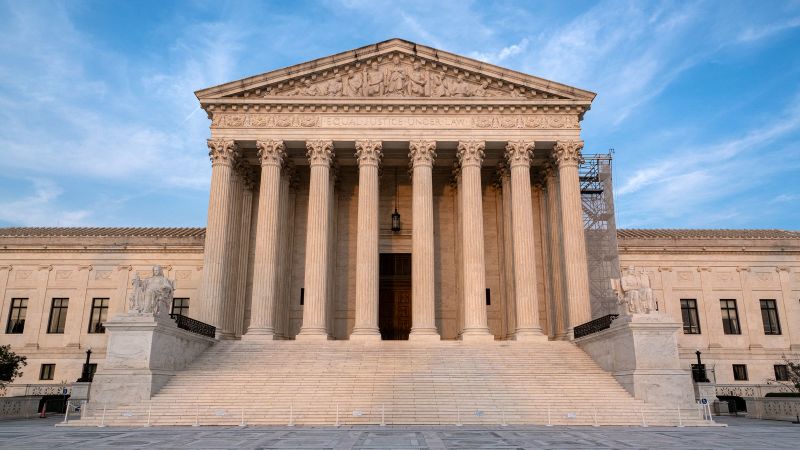
Teenager at center of case considers gender-affirming care "life-changing" One of the minors in Tennessee who challenged the law last year, identified in court papers as L. Williams, told CNN this week that receiving gender-affirming care has been “life-changing,” giving her more confidence as she navigates adolescence. “It’s been very helpful, very helpful – life-changing,” she said.
“For some people, it’s even been life-saving.” The state’s ban has forced her to travel out of state to continue receiving care for her gender dysphoria, the medical term for an uncomfortable conflict between a person’s assigned gender and the gender with which the person identifies. Williams will be in the courtroom on Wednesday to witness the historic arguments unfold – a unique position that seemed unlikely for the 16-year-old.

“I couldn’t imagine that I would be headed to the Supreme Court,” she said. Trump looms large over transgender legal fight President-elect Donald Trump ran for a second term in part on a message of ending “transgender craziness” and he specifically attacked Vice President Kamala Harris for supporting “they/them,” a reference to pronouns sometimes used by transgender and non-binary individuals. The Skrmetti appeal is likely to still be pending at the Supreme Court when Trump moves into the White House on January 21.
If the incoming Justice Department announces it is changing positions in the case, that could give the Supreme Court an out – an opportunity to dismiss the appeal. On the other hand, with the case fully briefed and argued there’s a good chance the court would simply proceed as planned. “It’s not all that unusual,” said Pratik Shah, a veteran Supreme Court attorney who is working with the ACLU on behalf of the trans clients.
“It shouldn’t change anything in terms of the court’s ability and process for deciding the case.” These are the states that have passed laws restricting gender-affirming care for trans youth Twenty-six states have passed bans on gender-affirming health care for transgender children and teenagers, according to a CNN analysis of data from the Movement Advancement Project, a nonprofit think tank that advocates for LGBTQ rights. An estimated 40% of transgender youth ages 13 to 17 live in these states, according to MAP and The Williams Institute.
These laws will be in the spotlight as the US Supreme Court hears oral arguments Wednesday in a case that challenges Tennessee’s ban on transgender care for minors. Gender-affirming care includes medically necessary, evidence-based care that uses a multidisciplinary approach to help a person transition from their assigned gender — the one the person was designated at birth — to their affirmed gender, the gender by which one wants to be known. So far this year, Ohio, Wyoming, South Carolina and New Hampshire joined the list of states banning gender-affirming care for transgender youth.
Maine and Rhode Island, on the other hand, passed laws protecting it. Not all laws banning gender-affirming care are currently being enforced . A legal challenge in Arkansas has halted the state’s ban while a temporary block is in effect in Montana .
New Hampshire’s ban on surgical care for minors will be enforced starting January 1, 2025 (though studies have shown gender-affirming surgeries on transgender minors are rare in the United States ). While Arizona has a 2022 law on the books banning surgical care for transgender minors, Democratic Gov. Katie Hobbs signed an executive order in 2023 ensuring access to gender-affirming health care.
Here's what to know about the Tennessee transgender care ban The state law, enacted last year, bans hormone therapy and puberty blockers for minors and imposes civil penalties for doctors who violate the prohibitions. It is among a growing number of state laws enacted in recent years targeting transgender care. Laws in Kentucky and Tennessee were challenged by the Biden administration and families of transgender minors.
The Supreme Court only agreed to hear the challenge filed by the Biden administration in Tennessee. In September 2023, the 6th US Circuit Court of Appeals in Cincinnati reversed a district court ruling that blocked the gender-affirming care ban from being enforced. In other words, the appeals court allowed the ban to take effect.
Republican lawmakers who support the ban say decisions about care should be made after an individual becomes an adult. Opponents argue that in addition to violating the civil rights of trans youth, the laws also run afoul of parents’ rights to make decisions about their child’s medical care. Tennessee’s law says that medical providers cannot perform procedures that “enable a minor to identify with, or live as, a purported identity inconsistent with the minor’s sex” or “treat purported discomfort or distress from a discordance between the minor’s sex and asserted identity.
” Read more about transgender care bans. In today's oral arguments on transgender care case, Supreme Court will consider how far equal protection goes When the Supreme Court hears the appeal from transgender youths challenging a Tennessee ban on their medical care , fundamental principles forbidding sex discrimination will be on the line. The justices’ view of whether landmark decisions tracing back a half-century apply to transgender rights will affect more than the access of young people to puberty blockers and hormone treatments.
At the case’s core is the crucial question of how much judicial scrutiny laws regarding transgender individuals demand. The legal standards invoked by black-robed jurists may seem dry and arcane. But in a case testing the reach of the Constitution’s equal protection guarantee, those standards set the terms of the debate and determine which side has the greater burden to prove its case.
Should regulations on transgender issues be regarded as a type of sex discrimination warranting “heightened scrutiny” and an important governmental interest to justify them, as the Biden administration and transgender advocates argue? That’s how some federal judges have seen it as they’ve struck down anti-trans policies, including those preventing minors from obtaining gender-affirming care. Or should a ban on transgender care be subject only to “rational basis” review, which requires a state to show that it is rationally related to a legitimate governmental interest? This method usually applies to commonplace business rules and requires judges to defer to state legislators. The answer to this threshold issue in Wednesday’s case will go a long way to determine the protections afforded transgender Americans in the future.
Read more about the case..














